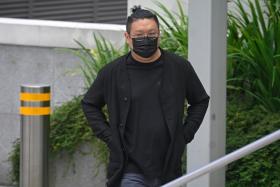CJ Menon urges for reform of law schools
'Perfect storm' of modern forces will change the way law is practised
The powerful overlapping forces of globalisation, technology and commercialisation have created a "perfect storm" that will irrevocably change the way law is practised, said Chief Justice Sundaresh Menon.
Making an urgent case for reform during a speech in the US last week, he urged law schools to examine whether what and how they teach are adequate to equip students with the right skills and values needed for modern practice.
He stressed the importance of a sense of unity, as law schools will need the concerted effort of law firms, senior lawyers, courts, regulators, fund providers and policymakers.
"If legal education is about to be caught in a perfect storm, a Herculean effort will be required to steer us to safe harbour, and law schools simply cannot do this alone," Chief Justice Menon said.
He sounded the clarion call while delivering a lecture at the Indiana University's Robert H. McKinney School of Law on Oct 30.
In his speech, Chief Justice Menon urged law schools to fundamentally re-imagine the current model of legal education that is widely adopted throughout the common law world, in view of the three trends confronting the profession.
First, globalisation has changed the "where" of legal practice by breaking down jurisdictional silos.
Second, technology has not only changed how legal services are delivered, but also what they are and who will deliver them. He cited the creation of the DoNotPay chatbot, an automated service provider that walks people through the process of appealing against their parking fines, as an example of how routine legal tasks are being automated.
Third, the commercialisation of legal practice has intensified, with companies prioritising short-term profits and the bottom line over professional values of service, honour and excellence.
Chief Justice Menon underscored the importance of having a sense of unity among all stakeholders by highlighting how these trends are set to raise difficult structural and policy questions in every area of law.
With modern technology shaping every aspect of life, new areas of law and substantive legal principles will emerge, he said.
Citing the example of driverless cars, he said there are already discussions over how liability for tort, or wrongful acts that cause harm, will be apportioned when the wrongdoer is a machine.
Apart from a unity of purpose, Chief Justice Menon identified two other key ingredients needed in the quest for change: a real sense of imagination and courage.
He said: "This is not the time for burying our heads in the sand.
"The changes that confront us are enormous and require all of us to pull together in the same direction, to put the needs of the next generation first, and to move decisively in their cause."
Failure by law schools to change, he said, "would be to do a disservice not just to their students, but to the profession and society as a whole".
Get The New Paper on your phone with the free TNP app. Download from the Apple App Store or Google Play Store now


